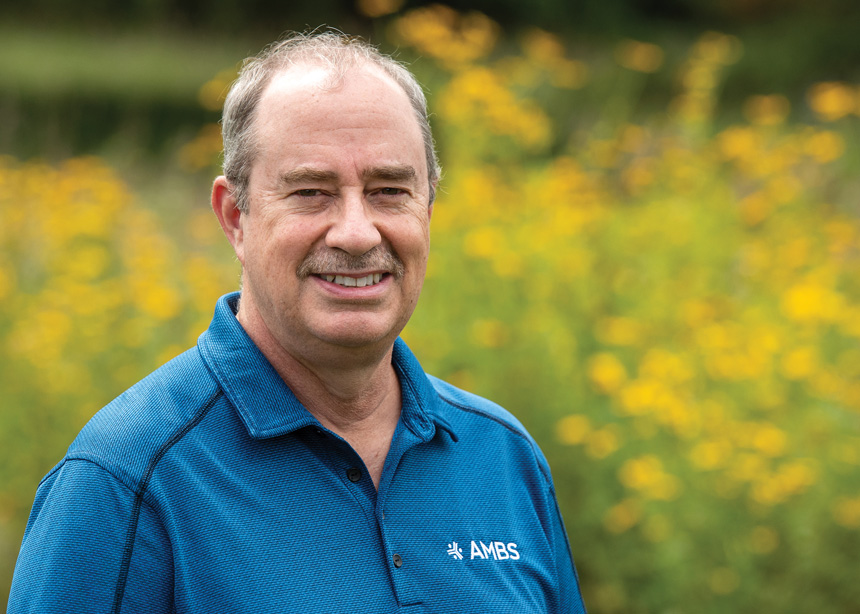“I think you are a contemplative.” Spoken by my spiritual director, those words caught me off guard. I’m not . . . am I?
But the more I thought about it, the more I realized he was right. At least in terms of orientation.
A crisis in ministry had caused pain and anger for myself and my family. I felt betrayed and abandoned. In the midst of this, the writings of Richard Rohr—a Franciscan priest based in New Mexico—began to hold special meaning for me.
My sister had gifted me two of his books: Breathing Under Water and Falling Upward. I resisted reading them, but when I finally did, years later, I knew I had found a spiritual home.
During the height of the turmoil in my church at the time, I was looking through my book collection for some spiritual guidance when I came upon Praying with the Anabaptists, a small book edited by Marlene Kropf, who had been my professor in seminary. The book highlighted prayers and practices of early Anabaptists. But it was the endorsements in the back that struck me—particularly one: “How strange and wonderful for a Catholic to be touched by this book! Heart, head, conviction and joy come through these prayers and songs. – Richard Rohr, O.F.M.”
I was rooted in the Anabaptist tradition and loved my spiritual heritage, and here was someone whose writings were inspiring me, transforming me, renewing my spiritual vision and endorsing my own tradition.

As I prayed for strength during my difficult time, Rohr’s teaching about non dualistic contemplative posture helped me survive the attack on my ministry by a small group in the church. I tried to pray for them rather than see them as adversaries. I tried to see beyond a simple either-or dichotomy.
In Richard Rohr’s words, “contemplation is a panoramic, receptive awareness whereby you take in all that the situation, the moment, the event offers, without judging, eliminating or labeling anything up or down, good or bad. It is a pure and positive gaze, unattached to outcome or critique.”
He says this does not come naturally to people in our era. It takes work and practices. “Moments of great love and great suffering are often the first experiences of nondual thinking,” he writes.
This was a gift to me in my hour of greatest need. Through great suffering, we can deepen our spiritual life. This gave me hope when there was darkness all around—to recognize I had a shadow side, just as I saw the shadow side in others. It gave me a new humility.
I embraced contemplative spirituality, even though I am still not very good at it. I have practiced centering prayer and walking contemplatively in the early morning. I have also been doing a variation of the Ignatian examen, a form of prayer that reflects on the day with gratitude by going through the highlights and lowlights of the day. I have picked up journaling again after a lapse of two-plus decades. Many of these practices I learned in college, church, seminary or elsewhere, prior to discovering the work of Richard Rohr.
I am grateful that Franciscan and Anabaptist spirituality share so many traits and practices. During the pandemic, I participated in the Center for Action and Contemplation’s Living School at the behest of my sister who works at the Centre, which is Rohr’s home base in Albuquerque.
My cohort were unable to meet in person during the two-year course, but I read the prescribed readings and practiced contemplative prayer. I was gratified to learn that contemplative prayer and practice goes back 2,000 years, with deep roots in Christian tradition.
Just prior to the pandemic, my sister Anita arranged for my wife, Wanda, and me to meet Rohr while we were in Albuquerque visiting our daughter. On my birthday, we went to Friday morning prayers at the Center and afterward to Rohr’s office, where he greeted us warmly. I wanted to talk about what his work and his books meant to me. Instead, I found myself talking about the recent crisis in my ministry. Rohr listened with great empathy and shared a few of his own struggles.
His personal care and prayer for me bonded with the words of his that I had read over the years. At that moment of crisis, I was being transformed. Instead of leaving the Christian faith, I was renewed. Instead of leaving ministry, I stayed. And I am grateful.
Doug Amstutz serves as pastor of Mannheim Mennonite Church near Kitchener, Ontario, and as Anabaptist Mennonite Biblical Seminary’s development associate for Canada.



Add new comment
Canadian Mennonite invites comments and encourages constructive discussion about our content. Actual full names (first and last) are required. Comments are moderated and may be edited. They will not appear online until approved and will be posted during business hours. Some comments may be reproduced in print.